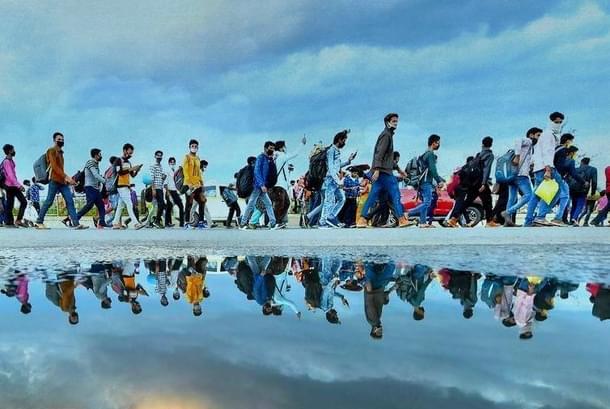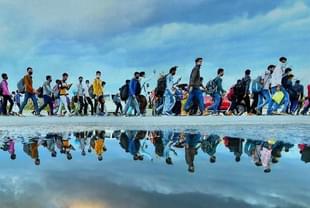Ideas
Covid-19 Response Exposes Limitations Of State Power: Empowerment Of Citizen Is The Way To Go
R Jagannathan
Apr 09, 2020, 11:03 AM | Updated 05:05 PM IST
Save & read from anywhere!
Bookmark stories for easy access on any device or the Swarajya app.


Even as India debates how soon, or how slowly, we should end our Covid-related lockdown, we need to bring another long-term topic for discussion: the need for a smaller and more effective state. Only a smaller, more competent state, can deal with the Covid-19 pandemic and other such challenges that the future may throw up.
Consider these contrasting images, one about the state trying to do its job, and another about how public empowerment is the way to go.
First, recall those images of lakhs of migrant workers beginning to walk back to their villages as soon as the national lockdown was announced. It was a demonstration of state incompetence.
Recall the huge queues of people outside shops and ATMs — in complete disregard of social distancing norms — seeking to get their free food supplies and cash the government put in their accounts. Again, evidence of good intentions having partially negative consequences.
Consider also how foolishly the state packed off the workers we need most — those who could deliver grocery and medicines to citizens — by restricting movements of even essential supplies. It took most cities at least a week to get that somewhat right. Give the bureaucracy and police a blunt instrument to halt pandemics, and this is what you get.
Conclusion: the state is bumbling and inefficient. It can use blunt instruments like executive fiats to command the wave to roll back, but it does more damage than good in the process. Trying to end shortages by raiding stockists or imposing a draconian Essential Commodities Act ultimately ends up choking supplies.
The issue is not about whether the lockdown was wise or not, but this kind of decision is best taken far lower in the political and administrative structure of the country — at the state, municipal, district and village levels.
Contrast this with the more recent efforts to popularise the wearing of masks in public spaces, which is now becoming increasingly mandatory in many cities, including Mumbai, Bengaluru and Delhi.
As newspapers and TV channels told viewers how to make their own masks, this has probably become an important work-creating cottage industry during Covid-19. Also, as information about the need to wash hands went viral through repeated emphasis, most people who do have access to adequate water supplies are probably doing so.
Few people needed to be told to buy hand sanitisers; it was the state that failed to make them available. Now fly-by-night operators are making them and selling fake sanitisers as the real thing.
Also check how easily most urban customers of banks are managing their financial transactions through the Internet, mobile, and QR Code-based money apps. The financial empowerment that accelerated after demonetisation and increasing formalisation of the economy is what is helping us now in this lockdown.
Consider what chaos there would have been if a huge chunk of the population had needed to visit bank branches for their everyday financial requirements during the pandemic.
Conclusion: when the state creates the conditions where people can help themselves, it is more likely to be successful in insulating them from catastrophe. By enabling the people to protect themselves instead of preventing them from even moving around their localities to buy essentials or visit pharmacies, the state is actually making a life issue into a livelihood issue. When livelihoods disappear, lives will too.
But there is this paradox to deal with. It is a reality that the state’s share of gross domestic product (GDP) grows as a nation grows richer, but this is not the same as saying the role of the state must increase with the size of a government’s budget. It is merely a signal that the state can provide an efficient route to channel its revenues to the provision of the right public goods — policing, law and order, enforcement of contracts, defence and internal security, health and education.
As state resources grow along with general prosperity, it must consciously start moving away from activities that others can do better, and especially the provision of private goods and services.
A private good is one whose consumption by one involves denying the same to others. Example: providing laptops as an election freebie. A public good is one whose consumption by one does not deny another the same benefit. Examples: good policing, efficient judiciary, universal access to healthcare.
Post-Covid, the Indian state must learn several things. Among them:
One, power must be devolved to the lowest level of administration and government, and citizens must be empowered to help themselves. The government should stop playing nanny. The Covid-19 pandemic has ensured that politicians now pose as saviours of the people by providing them with measly rations and medicines.
Two, all regulations that serve no purpose must go; state intervention in any sphere of activity must happen only in case of demonstrated market, economic, political or social failure.
Three, the state must recede from most commercial activities; it must expand, or enable the expansion of, the delivery of public goods, including health and education.
A competent state builds capacity in the areas that matter, and not in areas that the people can take care of themselves through empowerment, effective public communication, and private enterprise.
Jagannathan is former Editorial Director, Swarajya. He tweets at @TheJaggi.




